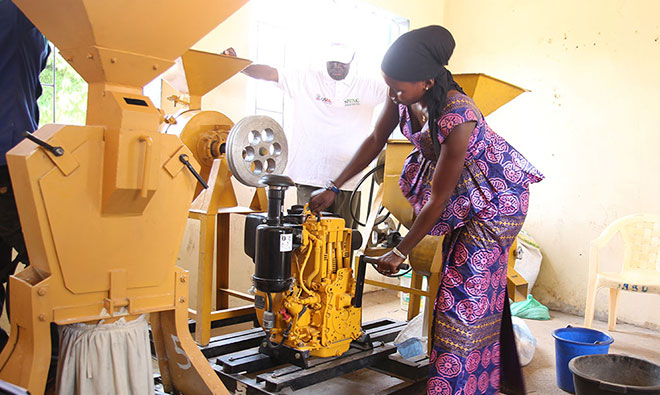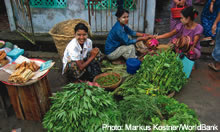
From May 4-8, 2017, SPRING/Senegal trained all six partner networks in Senegal on the technical and business elements of operating and maintaining cereal processing machinery.
As part of its multi-sectoral strategy to reducing malnutrition, SPRING aims to alleviate women’s workload so that they can devote more time, energy, and money to improving nutrition for themselves and their young children. Women are heavily involved in agriculture in Senegal and spend hours on farming tasks, in addition to their daily domestic chores. Many women farmers or their family members belong to local producer organizations, which support their members with access to inputs, credit, training and other services.
SPRING/Senegal partners with six agricultural partner networks in the Kaolack, Fatick, and Kaffrick regions to extend the reach of nutrition-sensitive agriculture activities. SPRING/Senegal procured and distributed two multi-function cereal processors to each of the six producer organization networks as part of an intervention to reduce women’s post-harvest workload and to improve their income. Each 3-in-1 processor performs functions traditionally done by women using a mortar and a pestle: shelling or husking cereals like maize, millet, and peanuts; grinding grains into flour; and blending groundnuts into groundnut paste (peanut butter). The partner networks contributed by identifying existing space or financing the construction of buildings to house the processors.
With Hydro-Bati-Mec (HBM), the Senegalese farm equipment company that supplied the machines, SPRING organized a training workshop for 25 members, including 12 women, from the six partner networks on different aspects of the processors. During the 5-day workshop, participants practiced fueling and oiling the machine, starting the motor, and shelling, milling and crushing different grains. They also learned about the finances of operating, cleaning and maintaining the machines, and business functions related to selling the processed cereal and renting time to use the machine. In addition to the knowledge and tools to sell the products they are now able to make, participants also learned about the benefits of using the profits to purchase nutritious crops for their home gardens, nutritious foods from the market, or to address their children’s needs such as health care and school fees.
